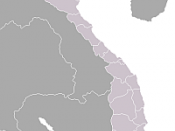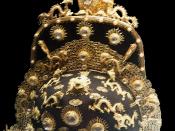The rise of commercialization along with population changes worked to reintroduce monarchies in Siam and Vietnam between 1750 and 1802. The Bangkok and Nguyen dynasties were powerful new dynasties. The Nguyen dynasty ruled over a newly united country of Vietnam while the Bangkok dynasty still exists today, yet it had to overcome the downfall of Ayutthaya. In order to understand the development and operation of these two early modern states, one must investigate economic, social, religious, territorial, and political administrative similarities and differences. Rulers were concerned about their labor force, legitimization of their rule, consolidation in territory and government, and dodging the threat of colonialism.
The Chinese expanding population relied on rice from the kingdoms in Vietnam and Siam while the Chinese traded textiles, tools, salt, and dried fish into Southeast Asian markets. Domesticated rice provided a needed economic base for the major kingdoms in Ayutthaya, Java, and northern Vietnam.
Rulers hired Chinese specialists in pepper and sugar cultivation in the Mekong Delta for the Nguyen dynasty in the 1800's (Owen, Emergence, p. 27). Taxes on imports and exports generated royal revenues along with the rental of market stalls and gifts from traders. Wealth empowered political power for it allowed soldiers and also funded the hiring of foreigners to learn their particular skills.
Men and women were forced by Siamese kings to work up to 6 months a year which was indicated by tattooed numbers in the 18th century. Similarly, Vietnamese emperor Quang-trung had the unsuccessful intention in 1788 to require all Vietnamese to carry identification cards with the names of their lineages and villages inscribed on them (Owen, Emergence, p. 70).
Mahayana Buddhism spread through Vietnam along with an interminglement of Daoism and Confucianism, due to their Chinese interactions. Mahayana typically allows laymen and women a larger part in...


